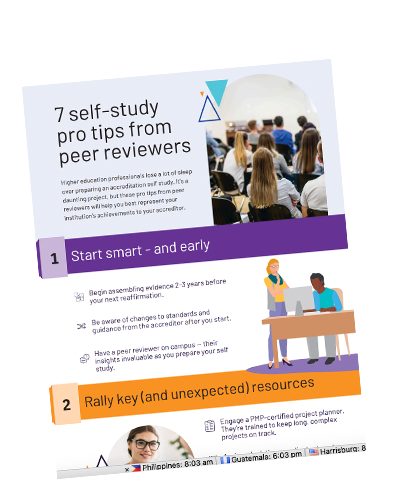Gearing up to tackle your next self-study? It’s a hard, high-stakes project, but never fear! Learn the best practices recommended by nine peer reviewers for gathering and sharing your institution’s mission, accomplishments, and evidence.
Get advice from experts who are responsible for accreditation reporting on their own campuses, and have served as peer reviewers for their regional accreditor.
You’ll learn:
Higher education professionals lose a lot of sleepover preparing an accreditation self study. It’s a daunting project, but these pro tips from peer reviewers will help you best represent your institution’s achievements to your accreditor.



“When you’re annually plugging your way through entering data, you’re essentially creating a repository to pull that information from over time. Pull assessment reports, interlink those into the argument to show continuous improvement and that every program was making an annual report. If you’re using a faculty activity reporting system, log faculty’s research and service as well as their teaching assignments so you can pull out of that to authenticate qualifications.”
– Summer DeProw, Interim Assistant Vice Chancellor for Academic Affairs, Director of Assessment, Arkansas State University


“Don’t hide anything, even if it seems problematic. Everyone has Google. Whatever you hide is just something the evaluators will find, and you’ll have to respond to later.”
– Jacob Ashby, Assistant Dean of Assessment and Articulation, Frederick Community College
“I tell my doctoral students to write their dissertations as if the reader knows nothing about their topic. For the institution, that means sharing your history, your culture — that needs to be quite evident in the self-study document. Be sure to tell your story under every single component of that standard in a way that I know who you are by reading your narrative. Many of your recommendations will stem from the reviewers just not having enough information about who you are as an institution.”
– Michele Atkins, Assistant Provost for Accreditation & Research, Union University
“Something that we look for in a self study is how easy is it to move through the links. Providing evidence means that it really has to be accessible, the link has to work or the PDF has to be there.”
– Sharon Enzor, Provost & Vice President, Blue Mountain College

“The team from a regional accreditor is checking to see that you’re making good on your promises. They just want to see that you actually do what you say you do. It’s an assurance. It’s a question of a rising tide raising all ships.Accreditation is in many ways that rising tide.”
– Cheryl Torsney, Vice Provost for Faculty Affairs, Middle Tennessee State University